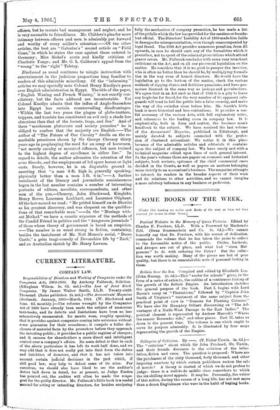C URRENT LITERATURE.
COMPANY LAW.
Responsibilities of Directors and Working of Companies under the Companies Acts, 1862-1900. By Anthony Paibrook, Solicitor. (Effingham Wilson. 3s. 6d. net.)—The Law of Joint Stock Companies. ' By James Walter Smith, LL.D. Twenty-sixth Thousand. (Same publisher. 2s. net.)—The Accountants' Magazine (Scotland). January, 1900—March, 1901. (W. Blackwood and Sons. 6d. monthly.)—The reforms wrought by the Companies Act of 1900 have already been made the subject of numerous text-books, and its defects and limitations have been no less exhaustively enumerated. Its merits were, roughly speaking, that it provides against companies coming into existence without some guarantee for their soundness ; it compels a fuller dis- closure of material facts by the promoters before they approach the investing public; it provides for a public register of charges ; and it secures for shareholders a more direct and intelligent control over a company's affairs. Its main defect is that in each of the above particulars it has left its work half done, and we may add that it does not really put into final form the duties and liabilities of directors, and that it has not taken into account certain judicial decisions in the past which, if still good law, may help to defeat some of its aims. For ourselves, we should also have liked to see the auditor's duties laid down in detail, for at present, as Judge Emden has pointed out, the auditor will often be made the scape- goat for the guilty director. Mr. Pulbrook's little book is a useful manual for acting or intending directors. for besides analysing fully the mechanism of company promotion, he has made a list of the pitfalls which the law has provided for the careless or fraudu- lent official. The Directors' Liability Act of 1890 made him liable in damages for misrepresentation, even though unaccompanied by legal fraud. The_1900 Act provides numerous penalties, from £5 upwards, in case he should omit any of the formalities which it prescribes, not to speak of the criminal prosecutions which attend graver errors. Mr. Pulbrook concludes with some very trenchant criticisms on the Act, and on all our piecemeal legislation on the matter. He considers that it is no good to pamper the investor, who is often no better than he should be, by multiplying formali- ties in the way even of honest directors. He would have the legislation go to the bottom of the matter, check the various methods of rigging shares and fictitious premiums, and have pro- moters licensed in the same way as jockeys and pawnbrokers. We agree that in an Act such as that of 1900 it is a pity to leave any loopholes for fraud, for the very number of its apparent safe- guards will tend to lull the public into a false security, and make the way of the swindler clear before hitt'. Mr. Smith's little book is more historical and less contentious. It provides a use- ful summary of the various Acts, with full explanatory notes, and references to the leading cases in company law. It is emphatically, both in form and matter, the business man's handbook to the subject. We have received the last volume of the Accountants' Magazine, published in Edinburgh, and mainly devoted to subjects connected with the profes- sion of chartered accountant. We notice it in this place because of the admirable articles and editorials it contains upon the subject of company law. We have rarely met with a technical magazine edited upon lines of such general interest. In the year's volume there are papers on economic and historical subjects, book reviews, epitomes of the chief commercial cases decided in the Courts, as well as papers on matters belonging more strictly to an accountant's business. The magazine attempts to interest its readers in the broader aspects of their work and its relations to other activities, and we cannot imagine a more salutary influence in any business or profession.










































 Previous page
Previous page